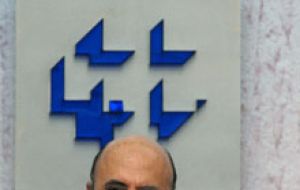MercoPress. South Atlantic News Agency
Brazil believes the Chinese currency will appreciate “a bit more” this year
 Brazilian central bank president Henrique Meirelles
Brazilian central bank president Henrique Meirelles China may let the Yuan gain “a bit more” within 12 months as the world’s third-largest economy moves away from a currency policy that creates distortions, Brazilian central bank President Henrique Meirelles said.
“We will see a bit more appreciated currency in a gradual move towards an open economy” a year from now, Meirelles said in an interview in Rio de Janeiro ahead of Chinese President Hu Jintao’s visit to Brasilia Thursday.
“We have expressed our opinion that all the currencies should float, and the Chinese currency should float as well.”
Meirelles’s comments add to international pressure on China to end the Yuan’s peg to the US dollar just as the heads of state from Brazil, Russia, India and China ready for their second summit in Brasilia this week.
Hu told President Barack Obama that China wouldn’t yield to “external pressure” after the US leader urged the Asian country to move toward a “more market-oriented exchange rate.”
A stronger Yuan would boost manufacturing exports for several countries, Meirelles said in the interview yesterday. For Brazil, a weaker Yuan creates fewer problems than for other countries, he said.
China surpassed the US as Brazil’s biggest trading partner last year, as exports of iron-ore and soy increased during the global financial crisis while sales of manufacturing goods to the US declined.
The appreciation of the Yuan “probably would mitigate the fact that Chinese exports are low priced,” Meirelles said. The weak currency “is a problem for some industrial sectors. It creates severe distortions in the world economy.”
Yuan forwards rose by the most this year on April 8 after the New York Times reported that the Chinese government is “very close” to changing its exchange-rate policy that has held the yuan at about 6.83 per dollar since July 2008.
Meirelles said it was up to China, as a sovereign nation, to manage its economy as it best saw fit. Any appreciation would be a “welcome move” that will help correct global economic imbalances, he said.
Several US lawmakers complain that China is deliberately keeping the value of the Yuan depressed to help its exporters, and have urged Treasury Secretary Timothy Geithner to label China a currency manipulator.
The leaders of Brazil, Russia, China and India held their first conference last June in the Ural Mountains city of Yekaterinburg, and ended the summit calling for emerging economies to have a greater voice in international financial institutions. Meirelles said he expected that this week the leaders will discuss ways to increase trade in local currencies.




Top Comments
Disclaimer & comment rulesCommenting for this story is now closed.
If you have a Facebook account, become a fan and comment on our Facebook Page!